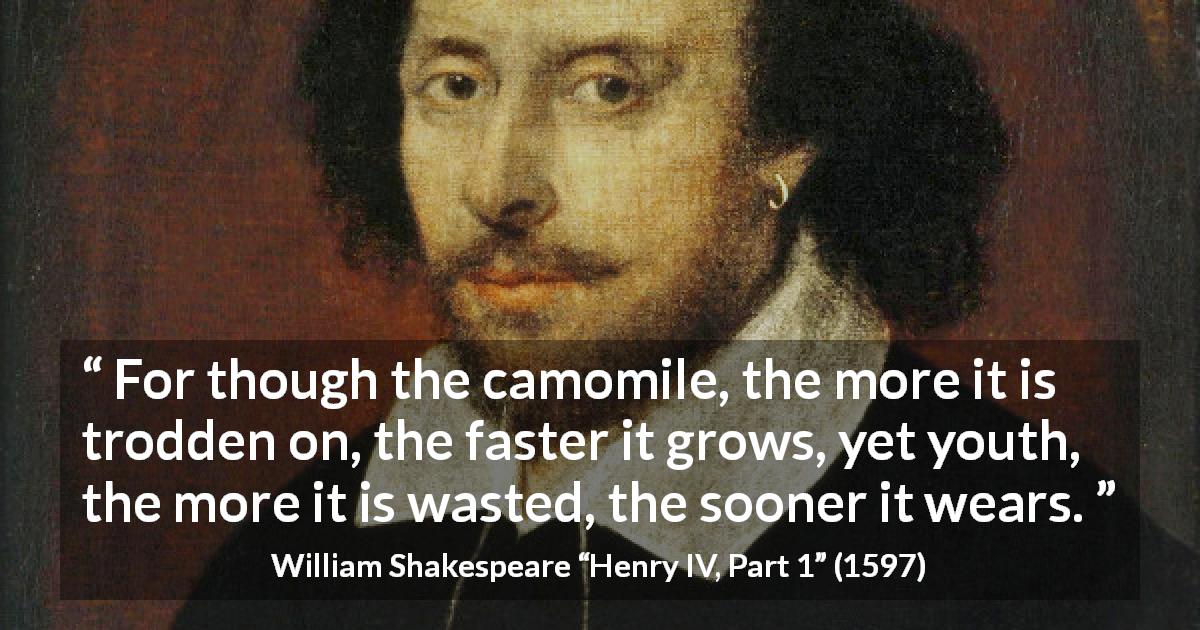

“I’ll thank myself / For doing these fair rites of tenderness. But again, after he pauses and covers Hotspur’s face, the first thing out of his mouth is how this act he’s putting on for the benefit of his audience will assist him in his power mongering.

After this slip, he rights himself and tempers his message a bit, to make it a general condemnation of the sin, not the sinner. He has risen to power, and crushed Hotspur soundly. He’s gleeful because now he is the only son remaining. trued as anything but a disturbing view into Hal’s immediate emotion. If Hal cared for homage, he would not feel the need to cry triumphantly, “How much art thou shrunk! which cannot be cons…. If he really had respect for Hotspur, his first line in eulogy would not be referencing Percy’s digestion by worms. He’s a manipulative man whose only goal is power. But Hal’s thoughts aren’t on high moral ground. He is now a Prince, and it seems like his thoughts and actions are on high. V:4:107) Hal takes Falstaff’s death in course, accepts it, and moves on. (V:4:104) Hal reluctantly acknowledges that he would have grieved for Falstaff – “I should have a heavy miss of thee / If I were much in love with vanity” – if he had not reformed. Because he has “reformed” his ways, Falstaff ranks only as an “old acquaintance. (V:4:103) Of Falstaff, Hal has little to say. And finally, Hal promises not to “remember” Hotspur’s treason. Then he continues, praising Hotspur for his virtues, for it is important to pay homage to duties done for the king. Hal has clearly come into his own here, and delivers a chastising almost worthy of a king. It is the speech of royalty, carefully phrased and in iambic pentameter. Hal clearly shows his countrymen that he knows greed is bad, and to look out for what happens if one gets too gluttonous. He starts by finishing the sentence that Hotspur began, and philosophizes a bit about the deadly sin that did him in: A kingdom for was too small a bound, But now two paces of the vilest earth Is room enough. After killing Hotspur, a respected rival, Prince Hal closes the chapter on him elegantly. In order to understand fully why Hal’s eulogies are a culmination of his quest for power, one must examine how he uses them to gain favor from the public. He will use the overtones and most of the direct meanings of what Hal says to convey a thoughtful prince he will use the undertones and occasional slips to give insight to the reality of Hal’s persona. Therefore, Shakespeare must spend most of Hal’s speeches using a convincing tone. Even though Hal is an amoral huckster, he must be able to convince others of his worthiness for the play to work. His basic behavior appears king-like, but the subtleties show his utter disregard for those who love him and his calculating mind making political estimates so that he can secure the throne. But while he delivers them, he is at his best, being the worst. After he gives them and Falstaff is found alive, he realizes that he has made a slight blunder and backs off a bit, allowing Falstaff some room to remain. His amorality culminates in his eulogies for Hotspur and Falstaff with the greatest grasp of power he makes in the play. But it is not just amorality that makes Hal a politician – he desires power as well. There is an amoral quality to Hal that allows him to change allegiances as political winds would call it wise. It would be impossible for a reasonable man to have boozed and bummed all of his teen years and suddenly renounce his life and become reborn. The first indication of this comes at his soliloquy in Act 2, Scene 1. Therefore, Hal’s fraudulence is hidden in undertones and slips of the tongue which he makes throughout the play. Shakespeare wants the play to seem sympathetic to Hal, and he wants Hal to convince the audience (populace) himself. So Hal needs to persuade a general population that he is competent in order to remain a king once he has obtained the throne.

Although Hal would not have to grovel for votes from England’s populace to become king, he does understand the problems of being an unpopular ruler from witnessing his father’s problems. In order to portray accurately the treachery and fickleness of Hal, Shakespeare must provide Hal with models to follow, rivals to defeat, and a populace to convince. Instead of presenting a rather common hero, Shakespeare sharpens the both sides of the sword and makes Hal a deceitful prince. Shakespeare gives the reader the opportunity to view the timeless duplicity of a politician in Prince Hal of Henry IV, Part 1.


 0 kommentar(er)
0 kommentar(er)
